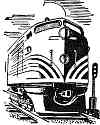|
A Radio Talk by Charles F. Kettering  At this very moment pilots in many lands are glancing at their
watches to see if their airplanes are running on schedule. A locomotive
engineer checks his watch as he passes a control tower to see if he is
on time. We work, eat, play and sleep by the clock. And now since we
can get accurate time by radio, we have a split-second check on our
schedules.
At this very moment pilots in many lands are glancing at their
watches to see if their airplanes are running on schedule. A locomotive
engineer checks his watch as he passes a control tower to see if he is
on time. We work, eat, play and sleep by the clock. And now since we
can get accurate time by radio, we have a split-second check on our
schedules.Two hundred years ago very few people could afford clocks and those available had only an hour hand. In America at that time, since wealth was a rarity so was time keeping equipment. Thomas Harland came over from London and started to make clocks in this country just before the Revolution. As his business grew he took on some apprentices, among them was a boy by the name of Eli Terry. After the usual seven years training, young Terry, at the age of 21, started his own business. In those days if you wanted a suit of clothes, a pair of shoes or a clock you went to the man who made such things and gave an order. Weeks later you were advised it was ready - no factory made goods were available. This business of making one at a time didn't appeal to Terry, so he decided to start a factory. In an old mill at Plymouth, Connecticut he made four wooden clocks in 1803. But customers didn't rush to his factory to buy these because they sold for such a high price - $25.00. |








